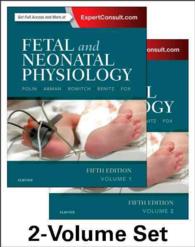- ホーム
- > 洋書
- > 英文書
- > History / World
Full Description
The last national election in Wilhelmine Germany was held on 12 January 1912. Voting was one of the few acts in German society that cut across class lines. The precincts were neither overwhelmingly working class nor middle class and from a distance it would have been impossible to tell those voters apart; they all wore black clothing. Almost all males over twenty-five voted in the 1912 election, and when the polls closed that Friday at 7:00 P.M., over 12 million men had cast their ballots, 84.2 percent of those eligible.
Historians have tended to interpret the Wilhelmine German electorate as though voters were marched to the polls in Prussianized battalions. Because the ballots determined neither the composition of the government nor the national policies, the only viable explanation for the heavy voter turnouts was thought to be governmental force. Electoral Politics in Wilhelmine Germany offers a new model of the German electorate which varies considerably from this interpretation.
Using techniques of electoral analysis developed for the study of elections in Britain and the United States, Stanley Suval argues that the German voters cast their ballots freely and positively. He demonstrates that the ballot was cast not to support the government or forward economic self-interest but to express fundamental social relationships present in everyday life. By voting, individuals were fulfilling their citizenship roles by expressing their commitments to social groupings. Suval defines these groupings using statistical analysis and qualitative evidence based on religious, class, and regional variables. He states that voters undertook an act that they felt was important, regardless of who won or lost.
Electoral Politics in Wilhelmine Germany also disputes the view that the German state worked to undermine the electoral system. Suval contends that the government and its bureaucracy often unwittingly increased the prestige of electoral politics by ensuring against massive fraud and by active participation in voter mobilization. The result was an integrated electoral system fueled by the commitments of the voters. Thus the Weimar Republic was not crippled at birth by its Wilhelmine inheritance. On the contrary, the Wilhelmine electorate was as prepared for its citizenship roles as were those in most contemporary democratic countries.
A UNC Press Enduring Edition -- UNC Press Enduring Editions use the latest in digital technology to make available again books from our distinguished backlist that were previously out of print. These editions are published unaltered from the original, and are presented in affordable paperback formats, bringing readers both historical and cultural value.








